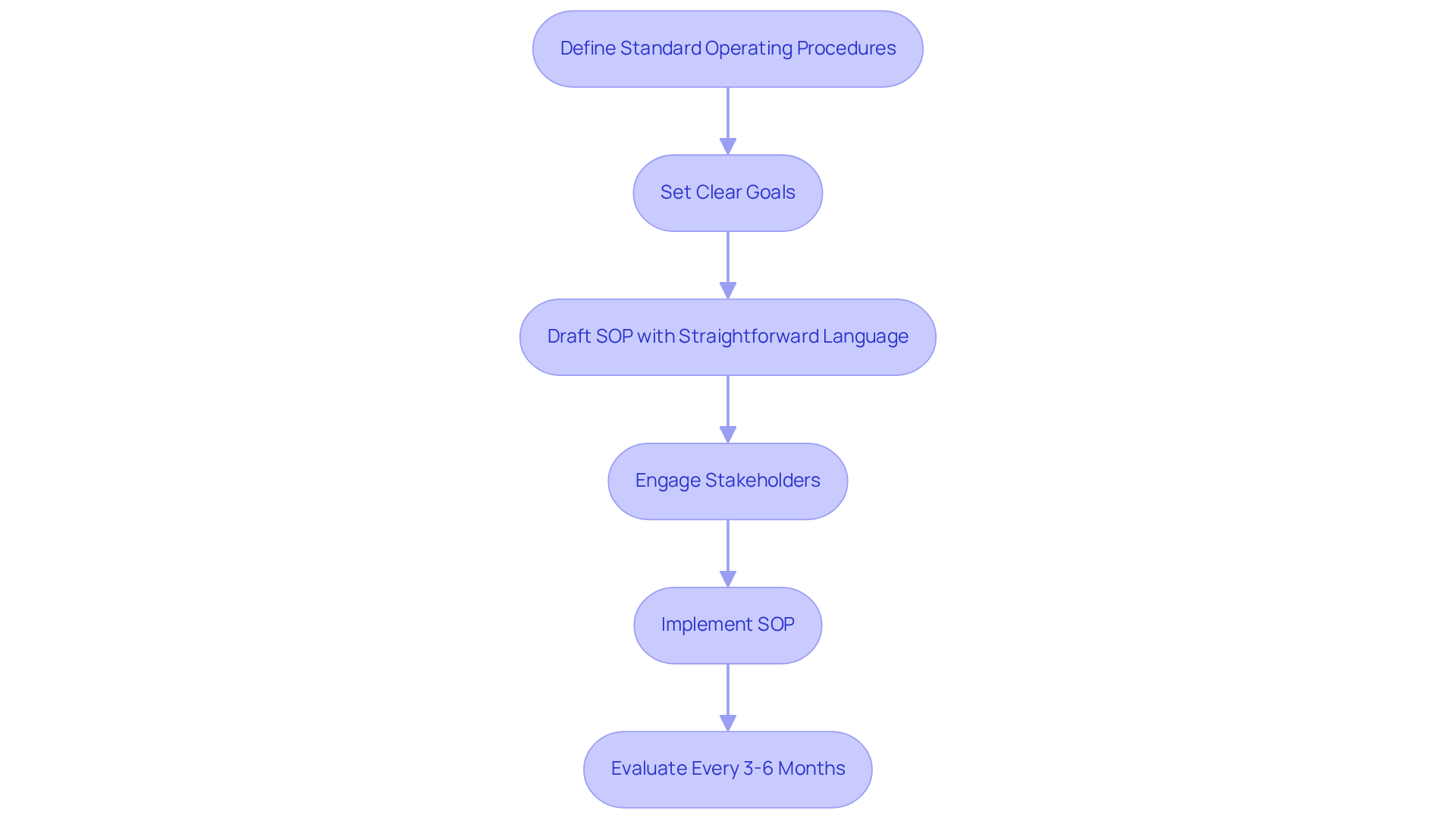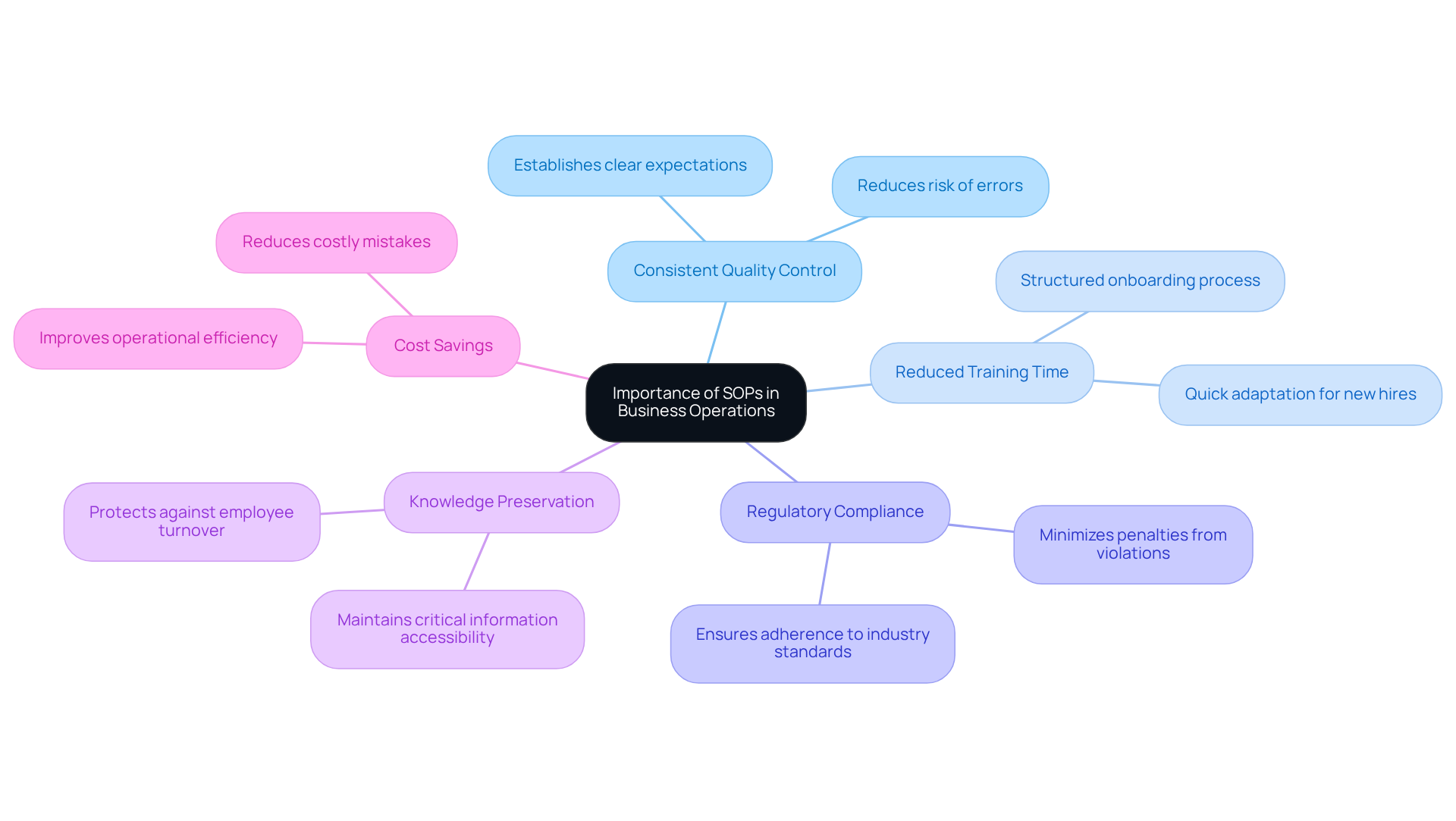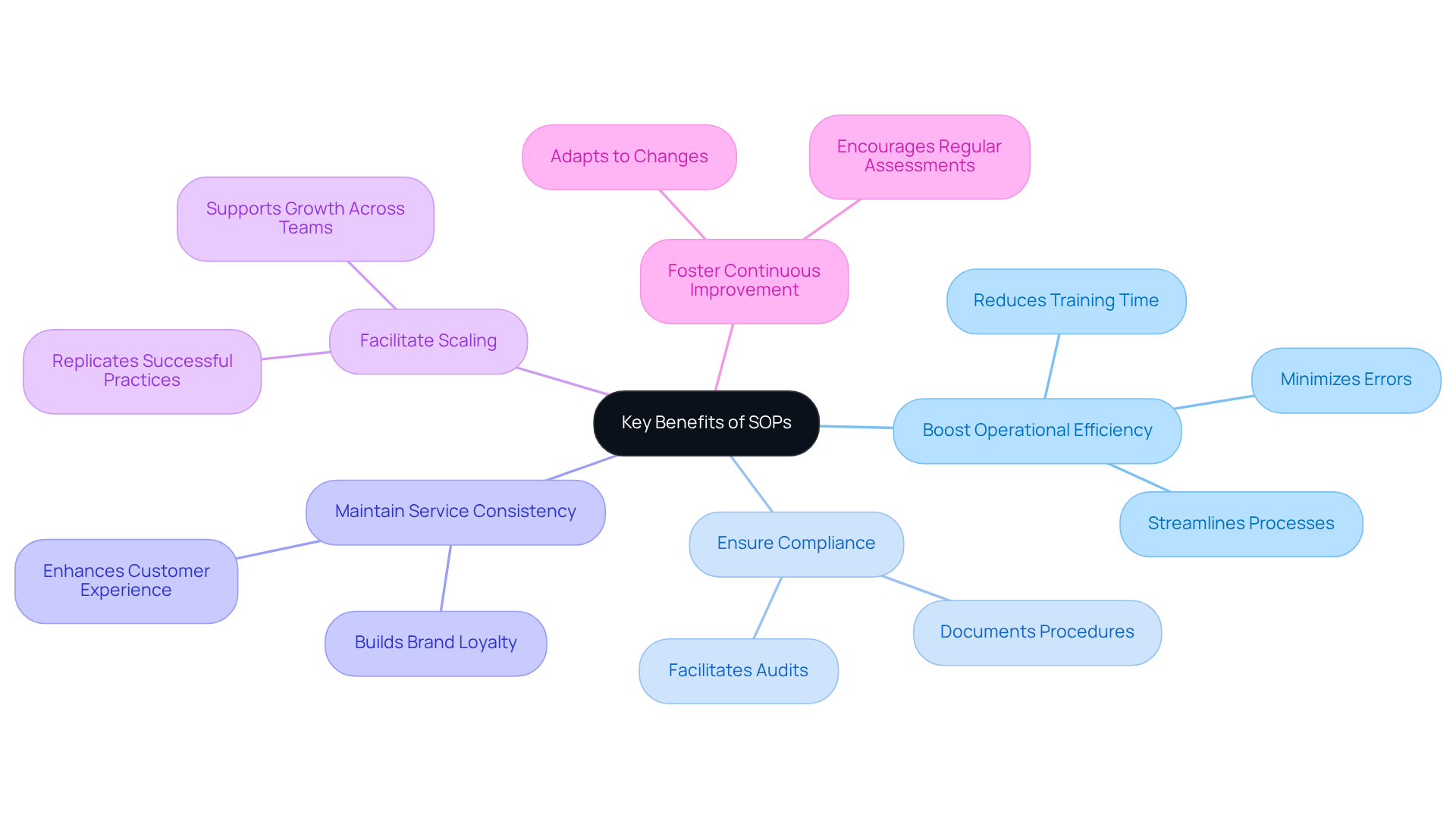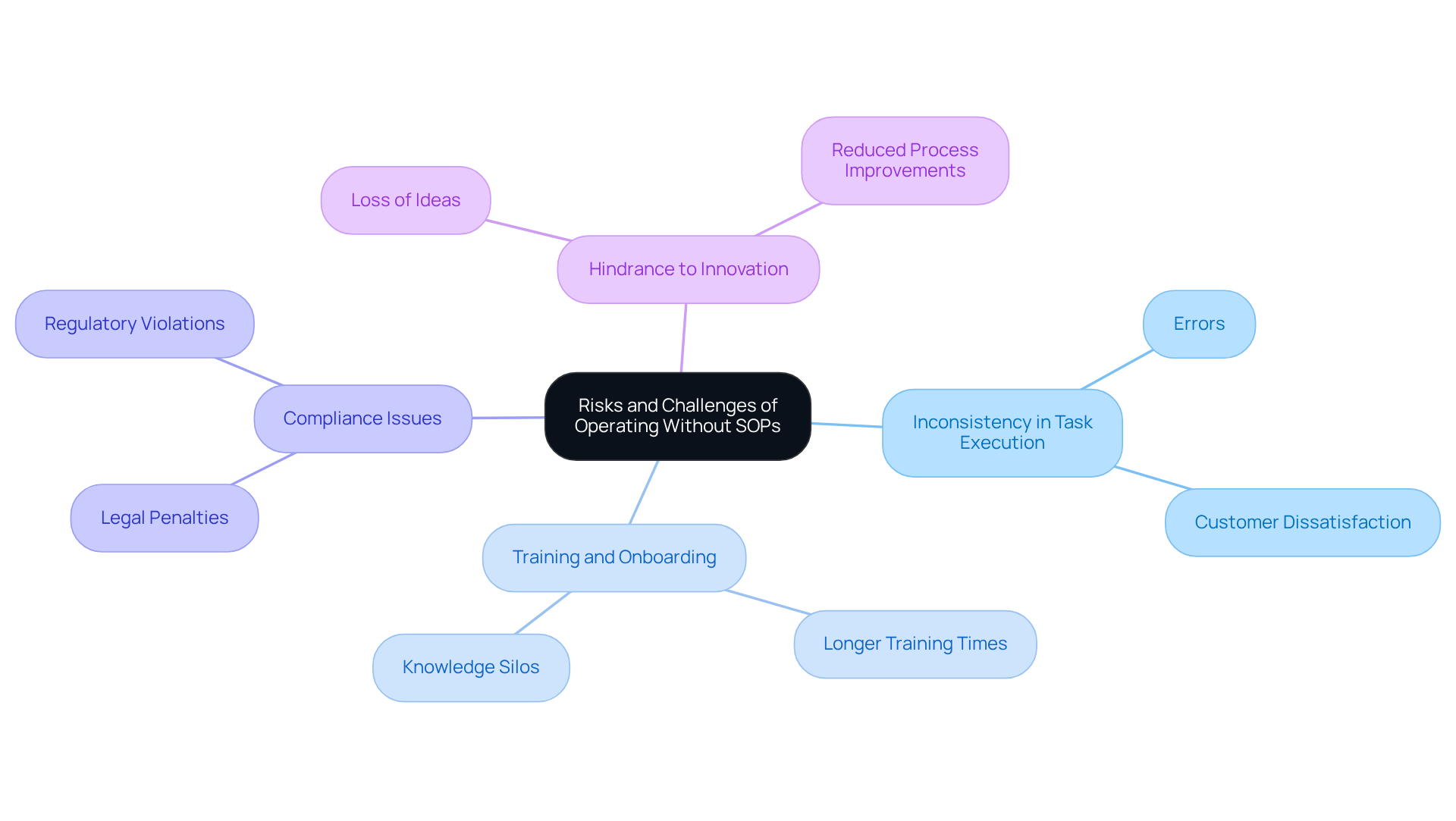
Overview
You might be wondering why Standard Operating Procedures (SOPs) are such a big deal for business success. Well, they’re essential because they:
- Standardize operations
- Boost quality control
- Enhance overall efficiency by providing clear, structured guidelines for tasks
It’s pretty neat how SOPs can help:
- Reduce errors
- Streamline training
- Ensure regulatory compliance
- Foster a culture of continuous improvement
Ultimately, this leads to increased productivity and happier customers. So, let’s dive into how effective documentation can really make a difference!
Key Highlights:
- SOPs are structured documents that outline specific steps for tasks to ensure consistency and efficiency in operations.
- The primary goals of SOPs include standardising operations, reducing variability, and enhancing quality control.
- Organisations with well-documented SOPs experience fewer errors and increased productivity.
- Effective SOPs should use straightforward language, have a clear structure, and be evaluated regularly for relevance.
- SOPs facilitate knowledge transfer, ensuring all team members are aligned on procedures.
- Key benefits of SOPs include consistent quality control, reduced training time, regulatory compliance, knowledge preservation, and cost savings.
- SOPs help new employees adapt quickly, fostering accountability and excellence within organisations.
- Without SOPs, organisations face risks such as inconsistent task execution, increased training time, compliance issues, and hindered innovation.
- Regular evaluation of SOPs is essential to maintain their effectiveness in a changing business environment.
Introduction
You might be wondering why Standard Operating Procedures (SOPs) are such a big deal. Well, they’re not just bureaucratic formalities; they’re actually the backbone of operational success in any organization! By standardizing tasks and ensuring consistency, SOPs play a crucial role in boosting efficiency, cutting down on errors, and creating a culture of accountability.
But what happens when these structured guidelines are missing? It can lead to some serious risks, like inconsistencies and compliance issues that could hurt a business's reputation and bottom line.
So, what are the real implications of implementing SOPs, and how can they change the way your business runs? Let’s dive into that!
Define Standard Operating Procedures and Their Purpose
You might be wondering what Standard Operating Procedures (SOPs) are all about. Well, they’re basically structured documents that lay out the specific steps needed to carry out tasks consistently and efficiently in a company. The main goal? To standardize operations and reduce variability, which in turn enhances quality control. By providing clear, step-by-step guidelines, these procedures not only help you stick to industry regulations but also support internal policies, leading to better operational efficiency.
Research shows that organizations with well-documented procedures see significant drops in errors and boosts in productivity. Plus, SOPs are key for knowledge transfer, ensuring everyone on the team is on the same page. So, what makes an effective SOP? Think straightforward language, a clear structure, and regular evaluations every 3 to 6 months to keep things relevant and effective.
Engaging stakeholders in the SOP creation process is super important for crafting practical and effective procedures. Speaking of that, using digital SOP software can really simplify the creation, distribution, and monitoring of these documents, making everything run even smoother. In a nutshell, standard operating procedures are essential tools for fostering consistency and operational excellence across teams and departments, which raises the question of why are standard operating procedures important. So, why not dive into creating or refining your SOPs today?

Examine the Importance of SOPs in Enhancing Business Operations
You might be wondering why standard operating procedures are important for businesses. Well, they’re essential for optimizing operations, which raises the question of why standard operating procedures are important, as they provide a clear framework for getting things done. By removing uncertainty, SOPs help your team understand their roles and the specific steps to take. This clarity not only boosts confidence but also enhances efficiency, which highlights why standard operating procedures are important, allowing everyone to perform their tasks consistently. Did you know why standard operating procedures are important for organizations to achieve significant improvements in operational efficiency? We’re talking about five main advantages, including:
- Consistent quality control
- Reduced training time for new hires
- Regulatory compliance
- Knowledge preservation
- Cost savings
Just think about it—minor OSHA violations can start at $1,221 for each penalty. That’s a hefty price for not having effective procedures in place!
Now, let’s talk about how SOPs make life easier during the onboarding process. They allow new employees to quickly adapt to their roles by following established guidelines. This structured approach not only speeds up the learning curve but also fosters a culture of accountability and excellence within your organization. By standardizing processes, companies can easily spot areas for improvement, leading to continuous enhancement of operational practices. It’s crucial to regularly evaluate your SOPs to ensure they stay relevant and effective in our ever-changing business landscape. Across various sectors, from manufacturing to healthcare, adopting SOPs has shown to improve staff training and onboarding, ultimately driving business success. Remember, the reason why standard operating procedures are important is that they ensure consistent quality and safety, safeguarding both employees and customers by setting clear expectations.

Identify Key Benefits of Standard Operating Procedures for Business Success
You might be wondering why standard operating procedures are important for businesses. Well, let’s break it down! First off, it's clear why standard operating procedures are important for boosting operational efficiency. They cut down on the time spent training new team members and help minimize those pesky errors that can pop up during task execution. Sounds good, right?
However, this leads us to the question of why are standard operating procedures important? SOPs help illustrate why standard operating procedures are important for ensuring compliance with regulatory requirements. Since everything is documented, it’s a breeze to audit and review procedures. Plus, they ensure that service delivery is consistent, which helps illustrate why standard operating procedures are important for keeping customers happy and coming back for more.
Now, let’s talk about scaling. Understanding why standard operating procedures are important enables businesses to replicate processes across different teams and locations without a hitch. And here’s the kicker: they foster a culture of continuous improvement. Companies can regularly assess and tweak their methods to keep up with the ever-changing business landscape and tech advancements. So, why not dive deeper into how SOPs can transform your operations?

Analyze Risks and Challenges of Operating Without SOPs
You might be wondering why standard operating procedures are important when organizations operate without them. Well, it turns out they can face some pretty significant risks and challenges, which raises the question of why standard operating procedures are important. For starters, inconsistency in task execution can rear its ugly head, leading to errors, a drop in work quality, and, ultimately, unhappy customers. And let’s not forget about training and onboarding—without SOPs, new employees might take longer to get up to speed, which means they’ll lean more on seasoned staff. This can create knowledge silos, where important information doesn’t get shared across the board.
Now, speaking of compliance, it raises the question of why standard operating procedures are important, as without documented procedures, organizations might find it tough to stick to industry regulations, which could land them in hot water with legal and financial penalties. Plus, the absence of SOPs can really put a damper on innovation and improvement. Employees often need a clear framework to spot and implement process enhancements, and without it, those bright ideas might just fizzle out. So, how can we tackle these challenges? Let’s explore some solutions together!

Conclusion
You might be wondering why Standard Operating Procedures (SOPs) are so crucial for operational excellence in any business. Well, think of them as the backbone that supports everything you do. By laying out clear and consistent steps for how tasks should be executed, SOPs not only boost efficiency but also help ensure quality control and compliance with industry regulations. The importance of SOPs really can’t be overstated; they create a structured environment where employees can thrive, nurturing a culture of accountability and continuous improvement.
As we wrap up, let’s highlight some key points about the benefits of implementing SOPs:
- They can improve training for new hires.
- They can cut down on errors.
- They can lead to significant cost savings.
- They help preserve knowledge.
- They ensure regulatory compliance—essential for staying competitive in today’s fast-paced business world.
Without these guidelines in place, organizations risk facing inconsistency, longer training times, and potential legal issues from non-compliance.
So, embracing the development and refinement of SOPs isn’t just a good idea; it’s a strategic must for business success. Companies should really take proactive steps to create effective SOPs that align with their operational goals. By doing this, they can safeguard their processes, boost employee performance, and ultimately drive sustainable growth. The real question isn’t whether to implement SOPs, but rather how quickly can businesses harness their power to transform operations for the better? Let’s get started!
Frequently Asked Questions
What are Standard Operating Procedures (SOPs)?
Standard Operating Procedures (SOPs) are structured documents that outline the specific steps needed to carry out tasks consistently and efficiently within a company.
What is the main purpose of SOPs?
The main purpose of SOPs is to standardize operations and reduce variability, which enhances quality control and operational efficiency.
How do SOPs benefit organizations?
Organizations with well-documented SOPs experience significant reductions in errors and increases in productivity. They also facilitate knowledge transfer among team members.
What characteristics make an effective SOP?
An effective SOP should use straightforward language, have a clear structure, and undergo regular evaluations every 3 to 6 months to ensure relevance and effectiveness.
Why is stakeholder engagement important in SOP creation?
Engaging stakeholders in the SOP creation process is crucial for developing practical and effective procedures that meet the needs of the organization.
How can digital SOP software assist in managing SOPs?
Digital SOP software simplifies the creation, distribution, and monitoring of SOPs, making the overall process more efficient and organized.
Why are SOPs considered essential tools for organizations?
SOPs are essential for fostering consistency and operational excellence across teams and departments, ultimately contributing to improved performance and quality control.
👍
What others are liking
5 Steps to outline your ideal documentation structure
5 MINS READ
Where to start the your journey of mapping out your ideal documentation structure, aligning it with the very heartbeat of your organization?
Defining a winning level of detail in your process
3 MINS READ
What is too much detail, and what is too little? This article described in that winning level detail about what detail is enough.





